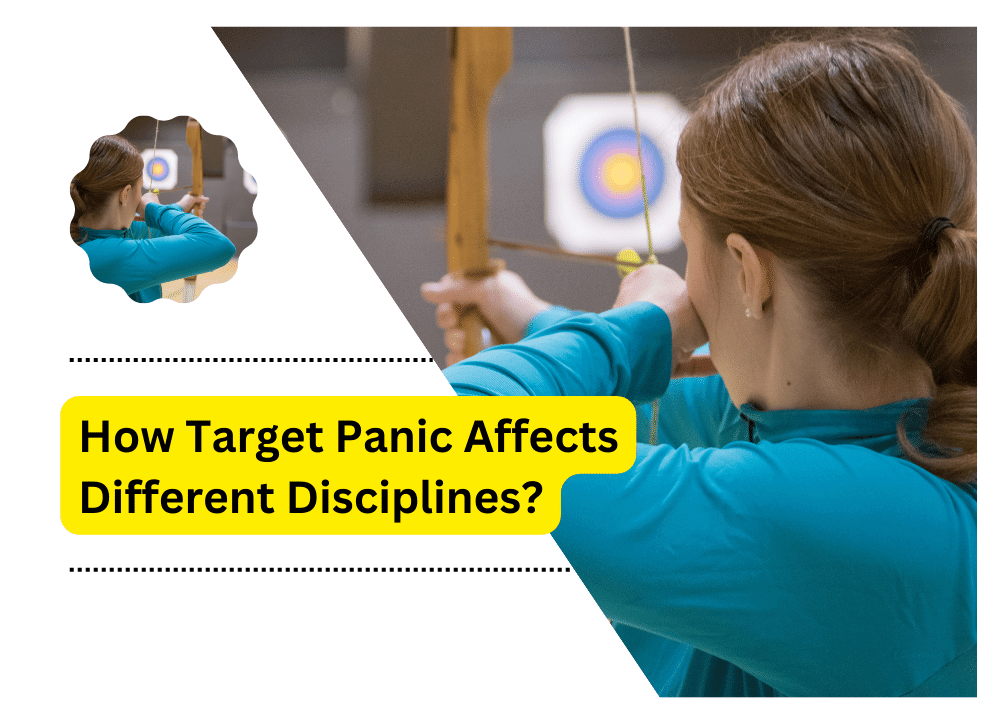
When most people think of target panic, they think of archery. After all, the sport has the most extended history of competitive shooting. But target panic can affect shooters of all disciplines, including rifle shooters.
Target panic is a condition that causes a shooter to lose control of their shot. When firing, they may jerk the trigger, flinch, or even close their eyes. As a result, their images will be inaccurate and wild.
Causes
Target panic can be caused by many things, including anxiety, excitement, or even boredom. It can also be caused by improper technique or equipment. Whatever the cause, it’s essential to identify and correct it as soon as possible.
How to Overcome Target Panic?
There are many ways to overcome target panic. Some shooters find success by using a release aid or shooting gloves. Others find that changing their grip or stance helps them to stay calm and focused. And still, others find that simply taking a deep breath and slowing down their shots is enough to improve their accuracy.
Whatever method you choose, you must keep practicing and working on your technique. With time and patience, you should be able to overcome target panic and shoot with precision and accuracy once again.
Why Does Target Panic Affect Different Disciplines Differently?
Different disciplines are affected in different ways when it comes to target panic. For example, archery requires high accuracy and focus, making it more difficult for those suffering from target panic to hit their mark. On the other hand, rifle shooting is more forgiving, as the larger bullet allows for a margin of error.
This can be frustrating for those who suffer from target panic, as it can feel like no matter what they do, they can’t seem to get it right. However, it’s important to remember that everyone experiences target panic differently, and there is no one-size-fits-all solution. As with anything else, finding what works best for you is vital to overcoming this obstacle.
Signs and Symptoms of Target Panic
When most people think of target panic, they think of archery. And this condition affects archers more often than any other type of shooter. But target panic can affect shooters of all disciplines, from Olympic rifle shooters to weekend blinkers.
Target panic is a condition that causes a shooter to lose control of their shooting. The most common symptom is flinching or jerking the trigger in anticipation of the shot. This can lead to missed shots or shots that are off-target. Other symptoms include:
Anticipating the shot
The shooter starts to think about the shot before they’re ready, and their muscles tense up in anticipation.
Misaligned sights
The shooter’s views must be lined up properly with the target. This can be caused by anticipatory muscle tension or simply not paying attention to detail.
Shaky hands
This is another symptom caused by anticipatory muscle tension. The shooter’s hands will start to shake as they get closer to taking the shot.
Target panic is a severe condition that can ruin a shooter’s accuracy and enjoyment of the sport. If you think you may be suffering from target panic, you must seek help from a qualified instructor or coach who can help you overcome this condition.
Techniques for Overcoming Target Panic
Regarding target panic, archery and rifle shooting are two very different disciplines. In archery, the goal is to hit a specific spot on the target, which can be difficult if you’re dealing with target panic. However, a few techniques can help you overcome this issue.
First, make sure that you’re using the proper grip. If your grip is too tight, it will cause your muscles to tense up, making it more challenging to hit your target. Instead, try to relax your grip and let the bow do the work.
Second, focus on your breathing. Taking deep breaths will help you stay calm and concentrate on your shot.
Third, take your time. Don’t rush your shot just because you’re feeling anxious. Take a few seconds to line up your shot and ensure you’re comfortable before releasing the arrow.
If you follow these tips, you should be able to overcome target panic and start hitting your targets with ease!
Archery-Specific Strategies for Battling Target Panic
Regarding archery, target panic can manifest itself in several ways. The most common symptom is what’s known as “target fixation,” where the archer fixates on the target instead of the proper sight picture. This can lead to “pulling” the shot or jerking the bowstring back instead of smoothly drawing it back.
Other symptoms include “flinching” at the moment of release or closing your eyes just before the arrow is released. This can all lead to inconsistency in shooting and, ultimately, lower scores.
So how do you combat target panic? One way is to focus on your breathing. Before you knock an arrow, please take a few deep breaths and let them out slowly. This will help you relax and focus on your shot.
Another strategy is to practice “dry firing.” This is simply releasing the bowstring without an arrow in place. Not only does this help you get a feel for the correct release, but it also helps build confidence that you will stay strong when an arrow is in place.
Feel free to take a break if you feel tense or anxious. Archery should be enjoyable, so if it starts to feel like a chore, take a step back and relax. Target panic is a natural phenomenon, but with some focus and practice, it doesn’t have to ruin your fun.
Rifle Shooting-Specific Strategies for Battling Target Panic
Regarding rifle shooting, target panic can manifest in several ways. The most common is that the shooter will start to anticipate the shot and flinch before the trigger is pulled. This can cause the image to go high or low and to the left or right of the target.
Jerking the Trigger
Another common symptom of target panic when shooting rifles is jerking the trigger. This usually happens when the shooter tries to hurry up and get the shot off before they lose their nerve. The result is a poorly well-aimed shot and often goes wide of the mark.
Breath Control
A few specific strategies can be used to combat target panic when shooting rifles. One is to focus on your breath control. Please take a deep breath and let half of it out before you squeeze the trigger. This will help you stay calm and steady your hand for a more accurate shot.
Comfort Zone
Another strategy is to take your time in setting up your shot. Ensure you are comfortable, have a good grip on the rifle, and are aiming carefully before you even think about squeezing the trigger. If you rush, you are likely to make mistakes that will send your shot off course.
Try to relax as much as possible when shooting. This may seem counterintuitive, but tensing up only makes it harder to shoot accurately. If you can learn to focus and breathe through the nerves, you will be surprised at how much better your shots are.
FAQ
Aiming plays a huge part into the progression of target panic and especially at long range when we’re trying to be ever so perfect. So, try taking off your sight and shooting shorter ranges.
It is now understood to be caused by the way in which the brain learns at a neurological level.
When used correctly, a hinge release removes the anticipation of the shot, freeing the archer to relax and let the sight pin float on target until the shot breaks.
Triggers for panic attacks can include over breathing, long periods of stress, activities that lead to intense physical reactions (for example exercise, excessive coffee drinking) and physical changes occurring after illness or a sudden change of environment
Conclusion
Target panic can affect all shooting disciplines, from archery to rifle shooting. By understanding the symptoms and causes of target panic, you can learn how to address it in your own way. Remember that no two shooters are the same, and what works for one may not work for another. With patience and practice, you can overcome your target panic and become a better shooter regardless of your chosen discipline.
